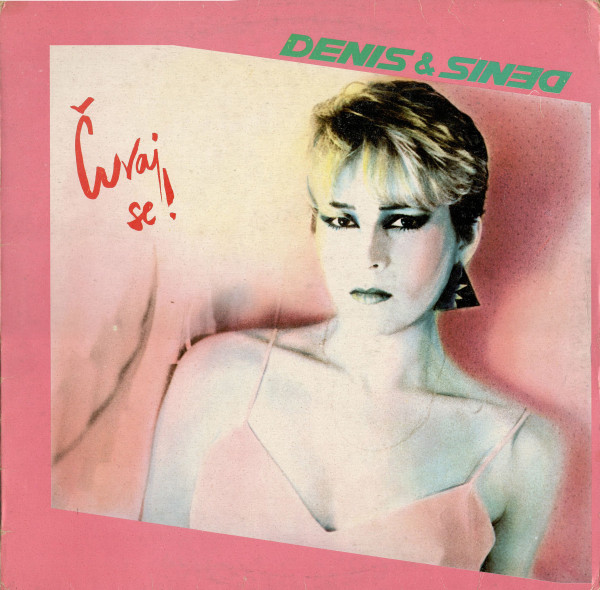In what was then Yugoslavia, cult synth duo DENIS & DENIS formed when vivacious vocalist Marina Perazić met synth player Davor Tolja in the Croatian port city of Rijeka in 1982.
Out of all the communist states during The Cold War, Yugoslavia was the most liberal with its citizens entering Jeux Sans Frontiers and Miss World including the 1983 contestant Bernada Marovt who had controversially appeared in nude photo sessions! Meanwhile as with today, the beautiful Adriatic coastline was a desirable holiday destination for Western Europeans.
The more open environment under the rule of Marshal Tito allowed the duo to hear the classic synthpop emerging from the UK such as YAZOO and EURYTHMICS, both of whom DENIS & DENIS were compared to, thanks to Tolja’s high production values and Perazić’s deep enigmatic voice which was laced with that Eastern Bloc allure.
Thanks to good quality demos being sent to the major radio stations of Yugoslavia and assorted live gigs, there was a domestic media buzz about DENIS & DENIS by the middle of 1983. Meaning “Take Care!”, the ‘Čuvaj Se!’ album was released on the state record label Jugoton in 1984.
The opening title song was suitably lively and accessible. It was up there with some of the best electronic music from Western Europe, with an appeal for those with English language ears like Scandinavian or Gallic pop. Telling the story of a lonely woman in an endless search for comfort, Perazić’s vocals were alluringly contralto while the combination of Linn Drum rhythms and percolating sequences came over like a less frantic YAZOO meeting the DEPECHE MODE-connected French synthpop trio VIENNA.
Maintaining the standard in an exploration of mundane daily routines, ‘Dvadeset I Osam Minuta Do Pet’ (“28 Minutes To Five”) was frantic synthpop laced with incessant sequencers as some wonderfully staccato vocal phrasing manifested itself by necessity to keep up with the pace. Meanwhile the catchy ‘Ti I Ja’ (“You and Me”) grabbed an Italo-styled resonance with a rugged machine hook and a Vince Clarke aping middle eight section.
Considered their best known song, ‘Program Tvog Kompjutera’ (“Your Computer Programme”) was like a sister song to ‘Dvadeset I Osam Minuta Do Pet’, but with Davor Tolja providing a vocal turn as well; the end result came over not unlike the 21st CENTURY YAZOO-influenced Swedish duo ALISON, especially in the chorus.
Another duet based around the passing of time, ‘Tek Je Sedam Sati’ (“It’s Just About 7”) was more directly YAZOO in arrangement with a distinctly Europop chorus amongst a backdrop of bleeps and solid metronomic rhythms. Also a duet, ‘Telefon’ drove into middle of the road territory as possibly the most conventional song on the album; despite the synths and drum machines, it was far less quirky in its emotive desire for reconciliation.
An enigmatic midtempo set piece about a relationship, Tolja took the lead vocal on ‘Sačuvaj Nešto’ (“Keep Something”), but with solid bass sequencing and squawking tremeloed guitar, ‘Doba Noćnih Kiša’ (“Rainy Nights”) stuttered into some bleeping autumnal electro-funk. To close and possibly shaped by the surrounding spectre of The Cold War, paranoia was the theme of the closing number ‘Dio Refrena’ (“Part Of The Refrain”), an atmospheric building synth ballad with spacey textures that ended the album on a more pessimistic note.
The release of ‘Čuvaj Se!’ led to several appearances on Yugoslavian national television while there was an ‘Album Of The Year’ award in the domestic music magazine ‘Rock’. But despite the acclaim, as with a number of acts in the West, things were never the same again and the magic was never to be repeated. The second album ‘Ja Sam Lažljiva’ (“I Am A Liar”) issued in 1985 was not so much an album, but a 5 track EP with bonus alternate versions. Stylistically, things became more confused, indicating conflicts between the pair in musical direction.
‘Soba 23’ (“Room 23”) took its lead from Howard Jones’ ‘What Is Love?’ while working the other way round, the guitar-driven ballad ‘Voli Me Još Ovu Noć’ (“Love Me More Tonight”) is said to have been the inspiration for the 1999 Ricky Martin song ‘She’s All I Ever Had’. Much jauntier than their previous material, the ‘Ja Sam Lažljiva’ title track grabbed a pseudo Caribbean feel, no doubt following the lead of CULTURE CLUB with timbale rolls thrown in for good measure. But it was the antithesis of the moodier introspection of ‘Noć’ (“Night”) which had more of a spiritual connection with their earlier material.
After the bland final non-album single ‘Oaze Snova’ (“Oases of Dreams”) in 1986, Perazić left to embark on a solo career. Tolja recruited Edi Kraljić who had provided backing vocals on ‘Čuvaj Se’ to front a rebooted DENIS & DENIS. However, not only did the all-male line-up change the visual dynamic but the ‘Budi Tu’ album in 1988 was more rock oriented, away from the synthy sound that had made DENIS & DENIS so appealing in the first place.
There were farewell reunion concerts with Perazić and Tolja in 2012 while in 2013, the instrumentalist relaunched the DENIS & DENIS name with a new female frontwoman Ruby Kolić and a new album ‘Restart’; but it didn’t and nothing could recapture poise or the glory days of the Marina Perazić fronted period and its playful charm.
Along with much of the best European synthpop from four decades ago, ‘Čuvaj Se’ has aged well and lasted the distance, sounding fresh and vibrant even now. The joys of DENIS & DENIS and this album in particular deserve to be discovered by the many ears worldwide that would have been unable to experience the duo back in their creative heyday.
All the tracks from ‘Čuvaj Se’ appear on ‘The Best Of Collection’ released by Croatia Records, available via the usual online platforms
Text by Chi Ming Lai
15th December 2022



Follow Us!